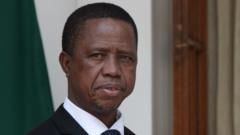Denmark, often viewed as a bastion of liberalism, has taken a hardline stance on immigration under its center-left government. The Social Democrats have shifted towards restrictive practices that echo the rhetoric of the far right, prioritizing national welfare over traditional asylum and immigration processes. This article explores the nuances of Denmark's policies and examines the broader implications for Europe's immigration landscape.
Denmark's Shift: A Left-Leaning Approach to Tightening Immigration Laws

Denmark's Shift: A Left-Leaning Approach to Tightening Immigration Laws
In a surprising twist, Denmark's center-left government has embraced stringent immigration policies, deviating from traditional norms and reflecting broader European migration trends.
In recent years, Denmark has garnered attention for its stringent immigration policies, a noteworthy departure from its reputation as a liberal, welcoming society. The nation, often associated with modernity and chic cities like Copenhagen, has become a symbol of restrictive migration laws, as noted by Marie Sandberg of the Centre for Advanced Migration Studies at the University of Copenhagen.
Historically, the rise of immigration in Denmark has roots stretching back to the aftermath of World War II, with significant increases over recent decades, particularly since the 2015 refugee crisis which saw over a million migrants streaming into Europe. During this period, slogans like "Danskerne Først" (Danes First) gained traction among the electorate, highlighting the growing anxiety over immigration's impact on Danish society.
In an unprecedented political maneuver, Denmark's Social Democrats have adopted hardline immigration policies traditionally reserved for right-wing parties. Under Prime Minister Mette Frederiksen’s leadership, the party has made a profound shift, often aligning with the views espoused by the Danish People's Party (DPP), which had previously championed anti-immigration stances. The Social Democrats argue that increased migration threatens the country's social cohesion and welfare systems, a move aimed at protecting public services that Danes expect in return for their high tax contributions.
Frederiksen's approach includes controversial measures such as confiscating valuables from asylum seekers and a legislative framework that makes it more challenging for refugees to seek family reunification. Denmark has also proposed processing asylum claims outside of European borders and even presented ads in Middle Eastern newspapers warning potential migrants about the nation’s tough policies.
Despite the criticism, which labels these policies as punitive and degrading to the rights of asylum seekers, the number of asylum applications in Denmark has plummeted. Some argue that while the policies have proven effective in decreasing immigration numbers, they also risk damaging Denmark's international standing regarding human rights and its commitment to humanitarian aid.
Contrastingly, in Spain, the approach is markedly different under the leadership of Prime Minister Pedro Sanchez. The Spanish government is actively pushing for the legalization of almost a million undocumented migrants to bolster its economy, illustrating a pivot towards a model that balances economic needs with social considerations. However, the political landscape in Spain is not without its challenges, as rising concerns about migration could lead to increased support for nationalist parties.
The divergence in Denmark and Spain's immigration strategies reflects a broader trend across Europe, where political parties are increasingly adopting rhetoric borrowed from traditional rivals to secure voter support. As the political landscape evolves, including in the UK, where leaders like Sir Keir Starmer face scrutiny over immigration policy, the ongoing discourse around migration continues to shape public sentiment and policy direction across the continent.
In conclusion, Denmark’s approach might offer a blueprint that resonates with other European nations grappling with migration challenges. However, it also raises critical questions about the balance between national interests and humanitarian obligations in an increasingly polarized environment.




















